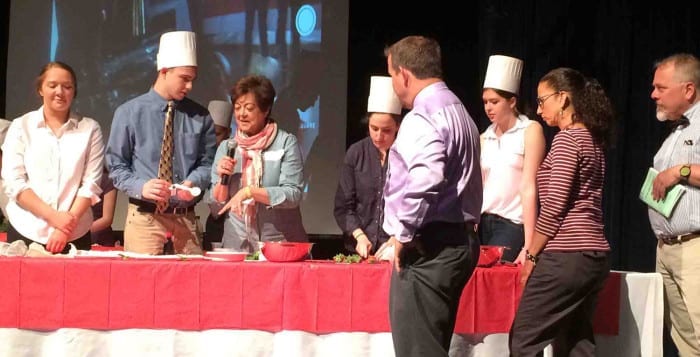Food for thought from Smithtown students

A whopping 840 Advanced Placement social studies students from both Smithtown High Schools East and West participated in this year’s edition of the Roger W. Sullivan AP History Conference, a showcase of individual and group research papers that relate to a certain theme in a specific discipline of social studies.
Students prepared papers and answered and addressed topical questions and dilemmas pertaining to food and society, this year’s conference topic. Now in its 26th year, the conference asks students enrolled in various courses like AP World History, AP Economics, AP Psychology and more to develop compelling research projects in the form of a written paper, accompanied by a visual presentation.
A total of 30 projects, one from each AP class, were selected for panel sessions in which the project creators presented their research to fellow AP students and fielded questions about their work. Panel sessions were moderated by Smithtown AP social studies teachers with help from outside college professors.
“It’s a tremendous honor for students to be selected to present at these sessions,” said AP Psychology teacher Chauncy Cone, who coordinated the conference for High School West.
Stephen Nadramia, an AP Economics teacher, was the coordinator for High School East. Among the topics students researched and presented were farming and class socialization, the food trade’s effect on cultures, how food regulations have evolved over the years, the high cost of organic food and child obesity.
Conference participants also heard from two experts on the topic of food: Ken Albala and author Pat Willard, who served as keynote speakers. Albala is a professor of history at the University of the Pacific in Stockton, California, where he teaches food history and the history of early modern Europe. He is also a visiting professor at Boston University, where he teaches an advanced food history course in the gastronomy program. He has authored and/or edited 16 books on food. Willard has authored four books of her own, including “Pie Every Day,” which was cited by the Atlantic Monthly, Bon Appetit and Amazon.com as among the top 10 cookbooks of 1997.
Albala talked about how throughout history power can be defined as control of the food supply. Willard’s talk traced how saffron traveled from its native home in the Middle East to around the world, along the way influencing different societies and cultures — essentially everything from medicine to beauty to cooking, depending on where it surfaced. She also gave each student a bag that held a saffron corm and a few threads.
Another part of the day-long activity was a Junior Iron Chef competition, held in conjunction with the Cornell Cooperative Extension of Suffolk County. Sixteen AP History students, who were also home and career students from HSE and HSW, were selected to take part in the competition, which required them to prepare a special dish assigned by program coordinator and community nutrition educator Maryann Birmingham. Students were judged on various elements of their dishes, including preparation, presentation and taste.
According to Director of Social Studies Michael Chlystun, the conference has evolved from 128 participants in 1990, thanks to the expansion of meaningful AP offerings and a genuine growth in student interest through the years.






